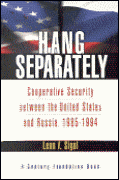Since the end of the cold war, the United States has, at times, displayed a reluctance to think cooperatively about its security. Nowhere has the U.S. propensity to coerce rather than cooperate been more pronounced-or more profoundly misguided-than in its dealings with the Soviet Union and its successor state, Russia. According to Sigal, the United States has fumbled its great opportunity to address the new nuclear dangers caused by the disintegration of the Soviet Union. Under Gorbachev and Yeltsin, Moscow was prepared to reduce radically its nuclear arsenal and dispose of its weapons-grade material. But instead of treating Russia as an ally, the realists who dominated American foreign policy sought to extract the maximum advantage in every negotiation, alienating Russia’s democrats and provoking a nationalist backlash.
Authors
